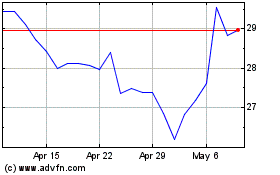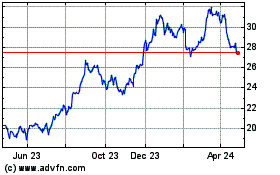UBS Chairman Weber Warns Against More ECB Stimulus
April 19 2016 - 5:00AM
Dow Jones News
WASHINGTON—UBS Group AG Chairman Axel Weber, the former
president of Germany's Bundesbank, warned that central banks in
Europe and Japan have reached the limits of monetary stimulus,
weighing into an increasingly fractious debate in Germany over the
European Central Bank's easy-money policies.
"We are now at a point…probably [where] the net benefits of
further monetary easing, in particular in Europe but also in Japan,
are outweighed by the costs and side effects," Mr. Weber said on
the sidelines of the spring meetings of the International Monetary
Fund and World Bank.
He warned that negative interest rates "are only possible for a
very short time and in close proximity to zero," and said he doubts
that the ECB's bond-purchase program will bolster economic growth
and inflation.
The comments from one of Germany's top economists come amid
mounting criticism in Germany of the ECB's â,¬1.5 trillion
stimulus, which has been expanded aggressively since December.
Allies of Chancellor Angela Merkel over the weekend called for a
German to succeed Mario Draghi as ECB president when his term ends
in 2019. The ECB urgently needs "a change of direction, more German
handwriting," Bavaria's finance minister Markus Soeder, a member of
Ms. Merkel's Bavarian sister party, told Germany's Bild
newspaper.
Mr. Weber was considered a lead contender in early 2011 for the
ECB's top job, which has never been held by a German. Instead, he
resigned amid a dispute over the ECB's bond purchases, leaving the
field open for Mr. Draghi.
Many of the ECB's recent decisions have been strongly criticized
in Germany, including the launch of its quantitative easing program
last year. But the criticism has grown louder in recent weeks
following its decision in March to launch sweeping rate cuts,
additional bond purchases and cheap loans for banks. The ECB's
deposit rate, charged for parking funds with the central bank, now
stands at minus 0.4%.
Mr. Weber warned that the financial system wasn't designed to
handle negative interest rates, and that such policies "can
substantially change the behavior of consumers and savers" if they
persist for a long period.
He also criticized the ECB's decision to pay banks to borrow
under a new series of four-year loans for banks, due to be launched
in June. The payment will be available if banks meet certain
criteria on net lending to the economy.
"It is the subsidy that is not sensible," Mr. Weber said.
Top ECB officials, including Mr. Draghi, have stressed in recent
days that they are ready to unleash even more stimulus if needed,
including fresh rate cuts.
Those statements appear to have rankled Berlin. German Finance
Minister Wolfgang Schä uble last week urged central banks to exit
easy-money policies and argued that the ECB was partly to blame for
the rise of a new anti-immigration party, the Alternative for
Germany.
The global economic community has largely sided with the ECB. In
a news release this weekend, Group of 20 finance ministers and
central bank governors called on policy makers to use all available
tools to bolster growth, including monetary policy. IMF chief
Christine Lagarde said this month that subzero interest rates were
"net positives" for the global economy.
Even Jens Weidmann, Mr. Weber's successor as Bundesbank
president, has sprung to the ECB's defense, arguing in Washington
on Friday that the central bank's policies are appropriate for the
eurozone as a whole.
But banks, particularly in Germany, have complained loudly that
subzero rates act as a tax because they can't easily be passed on
to customers.
Mr. Weber said the scope for future rate cuts may be limited.
Banks in Switzerland—which has introduced negative rates for some
bank deposits—have increased the costs of loans to offset losses
from negative rates, he said. Switzerland's deposit rate of minus
0.75% is "probably close to the limit of how negative interest
rates can go without causing a run on cash," Mr. Weber said.
He also questioned the ability of the U.S. Federal Reserve to
raise interest rates as other major central banks moved in the
opposite direction.
"Since the Fed cannot completely uncouple [from other
economies], it is likely that there is going to be a more cautious
policy response in the United States, because otherwise there would
be a stronger appreciation of the U.S. dollar," he said.
In the medium to long term, the Fed might risk falling behind
the curve on rate increases, Mr. Weber said. But "at the moment
there are no clear indications of that."
Write to Tom Fairless at tom.fairless@wsj.com
(END) Dow Jones Newswires
April 19, 2016 04:45 ET (08:45 GMT)
Copyright (c) 2016 Dow Jones & Company, Inc.
UBS (NYSE:UBS)
Historical Stock Chart
From Mar 2024 to Apr 2024

UBS (NYSE:UBS)
Historical Stock Chart
From Apr 2023 to Apr 2024
